What Alternatives to PayPal Handle Large Volume Crypto Transactions?
If your business handles a large volume of crypto transactions, you've likely realized that PayPal isn't just a less-than-ideal partner—it's a ticking time bomb. While its familiar interface is a decent starting point for small-scale commerce, its entire infrastructure is fundamentally incompatible with the speed, scale, and nature of cryptocurrency operations. Businesses experiencing rapid growth or processing significant crypto payments are finding themselves in a precarious position, searching for alternatives to PayPal that won't freeze their funds or shut them down at the first sign of success.
This post is your exit strategy. We'll break down exactly why PayPal’s model fails for high-volume crypto, explore the different tiers of available alternatives, and show you why a self-hosted crypto payment gateway is the ultimate solution for achieving financial sovereignty and unlimited growth.
The PayPal Problem for High-Volume Crypto Operations
This section explains why PayPal's aggregated account model and automated risk flags are fundamentally unsuited for businesses processing a high volume of cryptocurrency transactions.
The core issue is structural. PayPal operates on an aggregated merchant account model, pooling the funds of millions of businesses under its own master account. To manage the immense risk of this system, it uses aggressive, automated algorithms that are hyper-sensitive to any "unusual activity". For a business handling large volumes of crypto, nearly every aspect of its operation is a red flag. A sudden spike in transaction volume from a successful launch, a large number of international payments, or the inherent nature of crypto itself can trigger these automated systems.
As payment specialists at Signature Payments note, “Aggregate accounts, like those provided by PayPal, bundle multiple businesses under a single account, often leading to account freezes or closures due to perceived risks.”
The consequences are immediate and severe. Merchants report transaction caps that stifle growth, account restrictions, and—most critically—funds frozen for up to 180 days. For a crypto-native business, this seizure of digital assets and working capital is catastrophic. PayPal's vague Acceptable Use Policy gives it broad discretion to shut down accounts and even levy fines of $2,500 per violation, with little recourse for the merchant. This makes relying on PayPal for high-volume crypto processing an unsustainable gamble, especially for those in the iGaming or adult entertainment sectors.
Why High-Volume Crypto is Considered "High-Risk"
This section clarifies why businesses processing large amounts of cryptocurrency are automatically categorized as high-risk by traditional payment processors.
From a payment processor's perspective, "high-risk" is a financial calculation, not a judgment. A business is flagged as high-risk if it has a high potential for chargebacks, operates in a sector with a complex regulatory landscape, or simply processes a high volume of international, card-not-present transactions. Businesses that handle large volumes of crypto meet all of these high-risk criteria.
According to industry data, a chargeback rate approaching or exceeding 1% of transactions is a major red flag for most processors, often leading to account termination.

PayPal's Acceptable Use Policy explicitly restricts or prohibits services related to cryptocurrency exchanges due to financial complexities and regulatory oversight. 5 Even if you aren't an exchange, the high-velocity, borderless nature of crypto payments mimics patterns that traditional systems associate with fraud, leading to a high likelihood of account suspension.
As analysts from SwipeSum explain, “Sometimes it's not your personal track record but your industry's reputation. Banks and credit card networks maintain data on which industries statistically have more disputes or financial problems… that whole category gets a high risk label.”
The New Frontier: Why Crypto Payment Gateways Are the Superior Alternative
This section details how the architecture of crypto payment gateways directly solves the core problems faced by high-volume and global merchants.
For businesses trapped by the limitations of traditional finance, crypto payment gateways represent a fundamentally superior infrastructure. This shift is already clear from the high search interest for terms like "crypto payments" and "accept crypto payments," which indicates a broad move toward adoption.
Market Growth: The crypto payment gateway market is projected to grow from USD 1.2 billion in 2023 to USD 4.4 billion by 2032, registering a compound annual growth rate of over 15%.
The advantages are transformative, especially for businesses processing large volumes of transactions:
- Chargeback Elimination: Blockchain transactions are immutable. Once confirmed, they are final and cannot be reversed. This single feature eradicates the risk of fraudulent chargebacks, the primary reason processors penalize high-risk businesses.
- Lower Transaction Fees: Traditional processors can charge over 5% for high-risk merchants. Crypto payment gateway fees are often 1% or lower, with some models having no processing fees at all. For high-volume operations, this translates into massive savings.
- Faster Global Settlement: International bank transfers can take days. Crypto transactions settle in minutes, 24/7, anywhere in the world. This near-instant access to funds dramatically improves cash flow.
- Borderless and Scalable: Crypto payments transcend geographical barriers. A merchant can accept unlimited payments from anywhere without navigating correspondent banks or hitting transaction caps.
- Enhanced Security: By accepting crypto directly, merchants reduce their need to handle sensitive credit card data, lowering PCI compliance burdens and minimizing the risk of data breaches.
As Changpeng Zhao, Founder and CEO of Binance, famously stated, “I don't understand why anyone would not accept crypto for payments. It is easier, faster and cheaper to integrate than traditional payment gateways.”
The Sovereignty Decision: Custodial vs. Self-Hosted Crypto Gateways
This section explains the critical difference between custodial and self-hosted gateways and why it matters for financial control.
Choosing to accept crypto is the first step, choosing the right architecture is the most critical one. Crypto payment gateways fall into two categories: custodial and self-hosted (non-custodial). For a business seeking to escape the control of platforms like PayPal, this distinction is everything.
Custodial gateways (e.g., Coinbase Commerce, BitPay) function like traditional processors. They manage the private keys and hold your crypto on your behalf. While convenient, this model reintroduces a central point of failure. The provider can freeze your funds, enforce restrictive policies, and de-platform your business—the very problems you're trying to solve.
Self-hosted gateways (e.g., BTCPay Server, PayRam represent a paradigm shift. With this model, you run the payment software on your own server, giving you exclusive control over your private keys and your funds. Payments flow directly from the customer to your wallet without an intermediary. This delivers unparalleled benefits:
- Absolute Fund Control: No third party can freeze, hold, or seize your revenue.
- Censorship Resistance: Your business cannot be de-platformed for operating in a legally compliant but controversial industry.
- Enhanced Privacy: Core services typically do not require intrusive Know Your Customer (KYC) verification to get started.
- Cost Elimination: This model often eliminates processing fees entirely, leaving only the base blockchain network fee.
According to a 2024 analysis, 66.5% of crypto holders are now relying on non-custodial and mobile storage solutions, signaling a major shift toward self-sovereignty.
As one expert from Kraken explains, the choice comes down to the core crypto principle of "not your keys, not your crypto." With a non-custodial wallet, "the user is the only one with access to their private keys, and therefore, has complete control over their assets."
A Comparative Analysis of Top PayPal Alternatives for 2025
This section provides a tiered comparison of different solutions, highlighting features relevant to high-volume processing.
Navigating the landscape of PayPal alternatives requires understanding the different tiers of solutions, with self-hosted crypto gateways representing the pinnacle of financial autonomy.
Tier 1: Traditional High-Risk Merchant Accounts
Providers like PaymentCloud and Durango Merchant Services specialize in serving industries rejected by PayPal. They offer dedicated merchant accounts, which is an improvement. However, they still operate within the traditional banking system, meaning higher fees (2.7% to over 5%), rolling reserves that hold 5-10% of your revenue, and the continued risk of account termination.
Tier 2: Custodial Crypto Payment Gateways
Services like BitPay and Coinbase Commerce offer an easy on-ramp to accepting crypto. However, because they are custodial, they act as gatekeepers with their own acceptable use policies. For a business handling large volumes or operating in a gray area like online casinos, this is simply trading one master for another. Check out our detailed comparison of Payram vs BitPay and Payram vs Coinbase Commerce to learn more.
Tier 3: Self-Hosted Crypto Payment Gateways (The Ultimate Solution)
This category represents the ideal solution for merchants seeking true financial sovereignty and censorship resistance. By running the processor on your own server, you eliminate third-party dependency and transaction limits.
- BTCPay Server: As the leading open-source project, BTCPay Server is completely free, non-custodial, and has no processing fees. It is incredibly versatile and transparent, though it requires some technical skill to deploy and manage. See how it stacks up in our Payram vs BTCPay Server analysis.
- PayRam: This is a self-hosted solution engineered specifically for high-risk and high-volume businesses like iGaming and e-commerce. It offers a business-centric feature set with no mandatory KYC, 0% processing fees (with optional service fees up to 5% for advanced features like fund orchestration), and multi-chain support for Bitcoin (BTC), Ethereum (ETH), and stablecoins like Tether (USDT). With built-in accounting dashboards, automated payouts, and seamless OnRamp and OffRamp services, it provides a commercially supported solution designed for scalability and financial autonomy.
When choosing a provider, “Ensure that the payment processor has experience working with businesses in high-risk verticals. They must deeply understand your industry's specific challenges and compliance requirements.”
The Role of Stablecoins: Digital Dollars for High-Volume Commerce
This section explains how stablecoins eliminate volatility risk, making crypto practical for business operations.
A valid concern for any business is crypto's price volatility. This is where stablecoins become indispensable. Stablecoins are digital currencies pegged to a stable asset, usually the U.S. dollar, with popular examples being USDT (Tether) and USDC (Circle). The growing search volume for the term 'stablecoin' alone highlights its rising importance in the digital economy.
The global market for digital cross-border remittances is projected to hit $428 billion in 2025, and 15.8% of remitters are already using cryptocurrency for money transfers, with stablecoins leading the way.
For a business, stablecoins offer the best of both worlds: the price stability of fiat money combined with the speed and efficiency of blockchain technology. When a customer pays $100 in USDC, you receive exactly $100 in digital assets, eliminating volatility risk.
For international and high-volume commerce, the advantages are profound:
- Frictionless Global Transactions: Stablecoins act as a universal digital dollar, allowing you to pay global vendors and receive customer payments in minutes, 24/7, without the friction of the traditional banking system.
- Bypass Costly Conversions: Traditional cross-border payments involve currency exchange spreads that can cost 1-5%. By transacting in a single stablecoin, these costs are eliminated.
- Access to Underserved Markets: In regions with unstable local currencies, dollar-pegged stablecoins provide a reliable entry point into the global economy, opening up new customer bases.
As one guide from Bitwave notes, “Stablecoins bring stability, speed, and cost savings to cross-border payments - a dream come true for business owners tired of the old-school rigamarole of cut-off times, banking holidays, and capital controls.”
Implementation Blueprint: Your Guide to Financial Sovereignty
This section provides a straightforward, step-by-step guide for transitioning to a self-hosted payment system.
Transitioning from a platform like PayPal to a self-sovereign payment system is a strategic move to de-risk your business. Here’s how to do it.
Step 1: Setting Up Your Secure Wallet
The foundation of your crypto payment system is a secure, non-custodial wallet where you, and only you, control the private keys to your funds.
First, secure a hardware wallet, such as a Ledger or Trezor. This is the digital equivalent of a physical vault it stores your private keys offline, making them immune to online hacking. For daily operations, a "hot wallet" (software-based) is necessary to interact with the payment server.
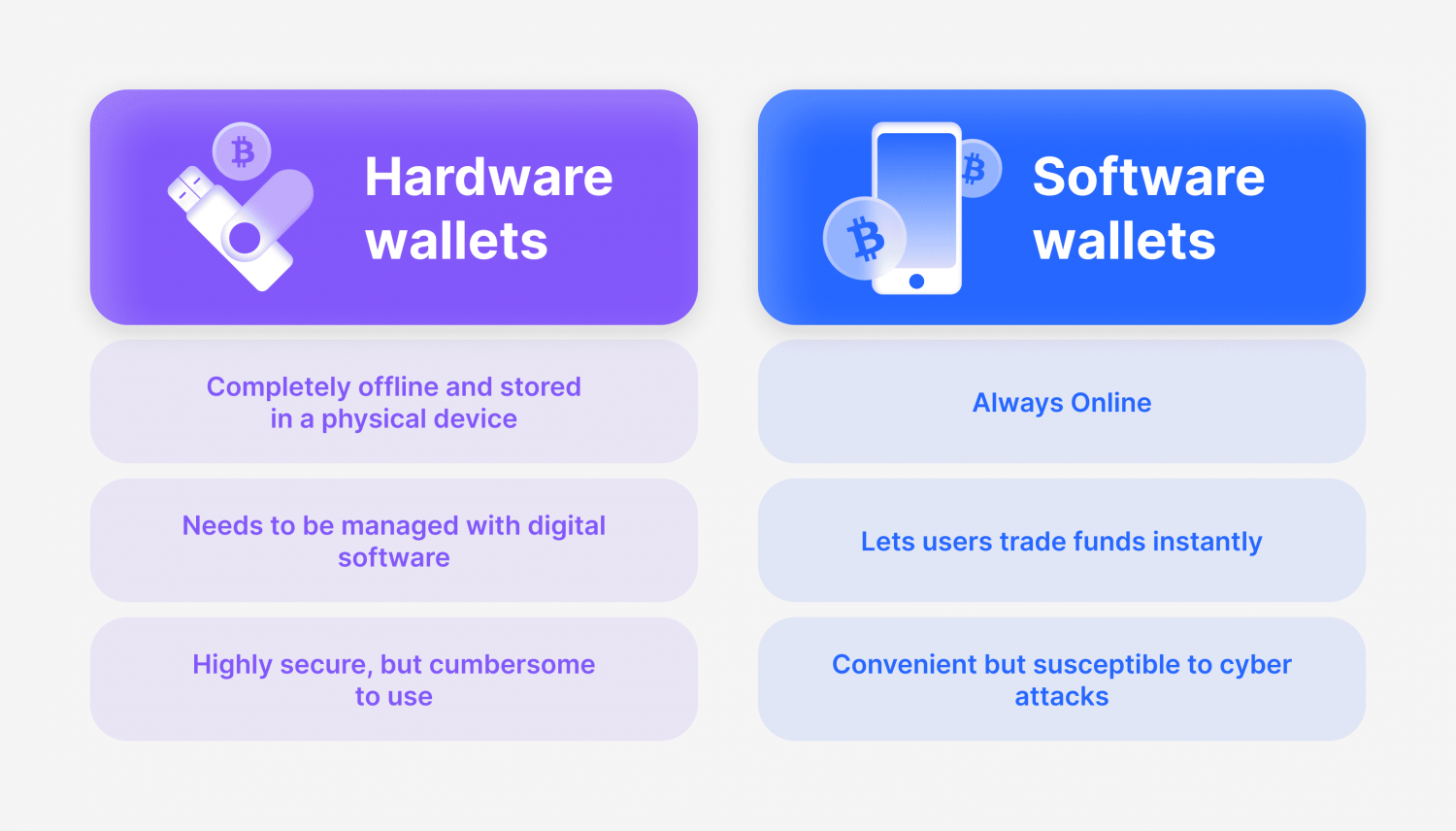
PayRam includes a built-in wallet that can be securely paired with your hardware wallet, offering an optimal blend of security and convenience. During setup, you will generate a "seed phrase" (12 or 24 words). It is absolutely imperative to write this phrase down and store it in multiple secure, offline locations. This is the master key to all your funds learn more about seed phrases and hd wallets.
Step 2: Deploying Your PayRam Instance
Follow these simplified steps to deploy your own PayRam instance, which will act as your personal, censorship-proof payment processor, ready to integrate with your website or platform.
Getting your own sovereign payment gateway running is easier than you think. While it involves setting up a server, the process is designed to be straightforward, and once deployed, all the powerful configuration is handled through PayRam’s clean, intuitive user interface—no deep technical expertise required.
- Prepare Your Server: First, you'll need a foundation for your gateway. This is typically a Virtual Private Server (VPS) from a provider like DigitalOcean or AWS. The minimum requirements are modest: a server running Ubuntu 22.04 with at least 4 CPU cores, 4 GB of RAM, and 50 GB of SSD storage. You'll also need to ensure standard web ports (80, 443, etc.) are open.
- Run the Simple Setup: With your server ready, you'll run a setup script that uses Docker to install the entire PayRam stack. This single step deploys everything you need—the core API, the database, and all necessary services—in an isolated, secure environment. For detailed commands, our Documentation has you covered.
- Configure Your Gateway in the Dashboard: Once the installation is complete, you'll access your PayRam dashboard through your web browser. This is where the magic happens. Through a simple UI, you will:
- Onboard Your Configuration: Set up your admin account and primary settings.
- Connect Your Blockchain Nodes: Go to Settings > Integrations > Node Details to connect to the networks you want to support, like Ethereum, Tron (TRX), and Bitcoin (BTC).
- Set Up Your Wallets: Navigate to the Wallet Management tab to connect the wallets where you'll receive your funds. You must add and deploy a wallet for each blockchain you plan to accept payments on.
- Onboard Your Configuration: Set up your admin account and primary settings.
- Integrate with Your Website: With your gateway configured, the final step is to connect it to your business. PayRam offers numerous simple integration options, from easy-to-embed HTML payment buttons to official plugins for popular platforms like WooCommerce and Shopify, allowing for a seamless checkout experience.
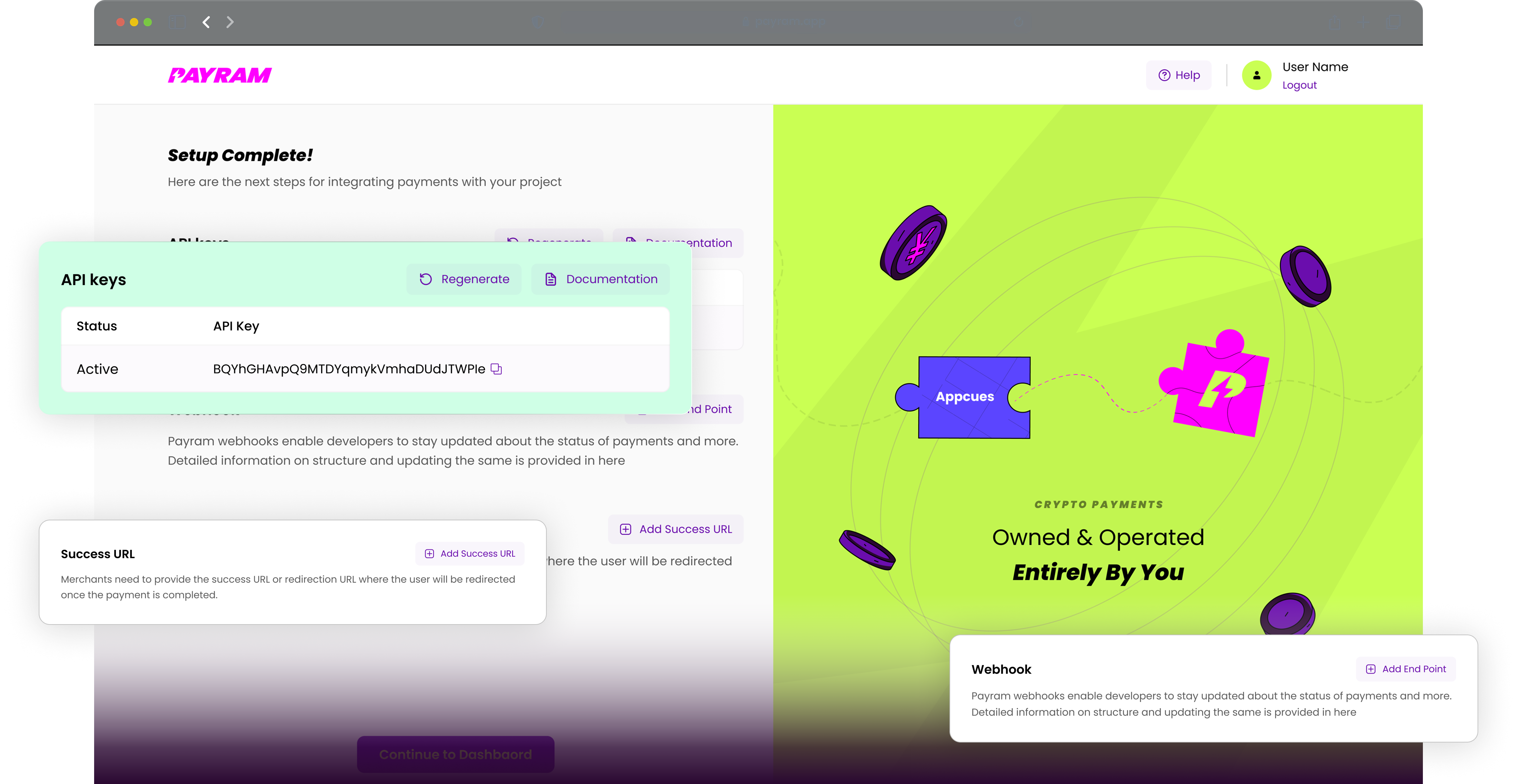
Step 3: Educating Your Customers for a Seamless Transition
Ensure a smooth adoption of crypto payments by clearly communicating the benefits of privacy and security to your customers and providing simple, clear instructions for how to pay.
First, create a dedicated FAQ page titled "How to Pay with Crypto." Explain the primary benefit for the user: enhanced privacy. Crypto payments are pseudonymous and, crucially, do not appear on a credit card statement with an explicit billing descriptor that could cause personal issues.
Second, incentivize adoption by offering a small discount (5-10%) for all crypto payments. This is financially sustainable because you are no longer paying the exorbitant 5% to 15% fees charged by traditional high-risk processors.
Finally, provide simple, visual guides showing customers how to acquire stablecoins (USDT or USDC) on a reputable exchange and send them to the payment address on the PayRam invoice. This small investment in education can significantly increase adoption.
Conclusion: Reclaim Your Financial Freedom
For any business handling a large volume of crypto transactions, relying on traditional processors like PayPal is an unsustainable risk. The platform's structure creates a constant threat of frozen funds, arbitrary restrictions, and sudden de-platforming.
The path forward is clear: self-hosted cryptocurrency payment gateways, powered by the stability of digital dollars, offer a permanent solution. This model is a structural upgrade that grants true financial sovereignty, allowing you to:
- Eliminate Chargeback Risk entirely.
- Drastically Reduce Fees, boosting profit margins.
- Achieve True Censorship Resistance and operate without fear of being shut down.
- Unlock Global Markets with no transaction limits.
Frequently Asked Questions (FAQ)
1. What is a crypto payment gateway?
A crypto payment gateway is a service that enables merchants to accept digital currencies like Bitcoin, Ethereum, and stablecoins as payment for goods and services. It acts as an intermediary that facilitates the transaction on the blockchain, similar to how a traditional payment processor handles credit card payments.
2. Why is PayPal considered high-risk for crypto transactions?
PayPal's system is designed for traditional fiat currency and uses automated algorithms that often flag the high volume, high value, and international nature of crypto transactions as suspicious. This can lead to sudden account freezes, fund holds for up to 180 days, and even permanent bans with little recourse.
3. What's the main difference between a custodial and a self-hosted gateway?
The main difference is control over your funds. A custodial gateway (like Coinbase Commerce) holds your private keys and your crypto for you, reintroducing a third party that can freeze your assets. A self-hosted non-custodial gateway (like PayRam) allows you to run the software on your own server, meaning you are the only one who holds the private keys and has complete control over your money.
4. Are crypto transactions reversible like credit card chargebacks?
No. Transactions on a blockchain are immutable and final. Once a payment is confirmed, it cannot be reversed by the customer. This permanently eliminates the risk of fraudulent chargebacks, a major advantage for high-risk businesses.
5. What are the typical fees for using a crypto payment gateway?
Fees vary. Custodial gateways typically charge around 1% or more. Self-hosted solutions like BTCPay Server have 0% processing fees. PayRam also offers a 0% processing fee for its core service, with optional fees for advanced features like fund orchestration. The only other cost is the small, variable network fee required by the blockchain itself.
6. Do I need to be a technical expert to use a self-hosted gateway?
While some technical knowledge is helpful, it's becoming much easier. Solutions like PayRam are designed for streamlined deployment and can be set up in minutes using Docker. They also come with business-friendly dashboards and documentation to guide you through the process.
7. How do stablecoins help with accepting crypto payments?
Stablecoins (like USDT and USDC) are pegged to a stable asset, usually the U.S. dollar. They solve the problem of price volatility. When you accept a payment in a stablecoin, you receive the exact value of the sale without worrying that the price of the crypto will drop before you can convert it. Learn more about stablecoin business use cases on our blog.
8. Can I accept crypto from customers all over the world?
Yes. Cryptocurrencies are borderless. A self-hosted payment gateway allows you to accept payments from anyone, anywhere in the world with an internet connection, without needing to deal with international banking restrictions or high currency conversion fees.
9. Is a crypto payment gateway secure?
Yes, crypto payment gateways are built on blockchain technology, which is inherently secure due to its decentralized and encrypted nature. With a self-hosted solution, security is further enhanced because you control your own private keys, removing the risk of a third-party provider getting hacked.
10. Do I need to complete KYC to use a crypto payment gateway?
It depends on the provider. Most custodial gateways require KYC (Know Your Customer) and AML (Anti-Money Laundering) verification. However, self-hosted solutions like PayRam do not require mandatory KYC for their core service, offering greater privacy for both you and your customers.
Ready to process unlimited crypto transactions without fear of freezes or restrictions?PayRam can provide the financial sovereignty your business needs and take back control of your revenue today.


.svg)



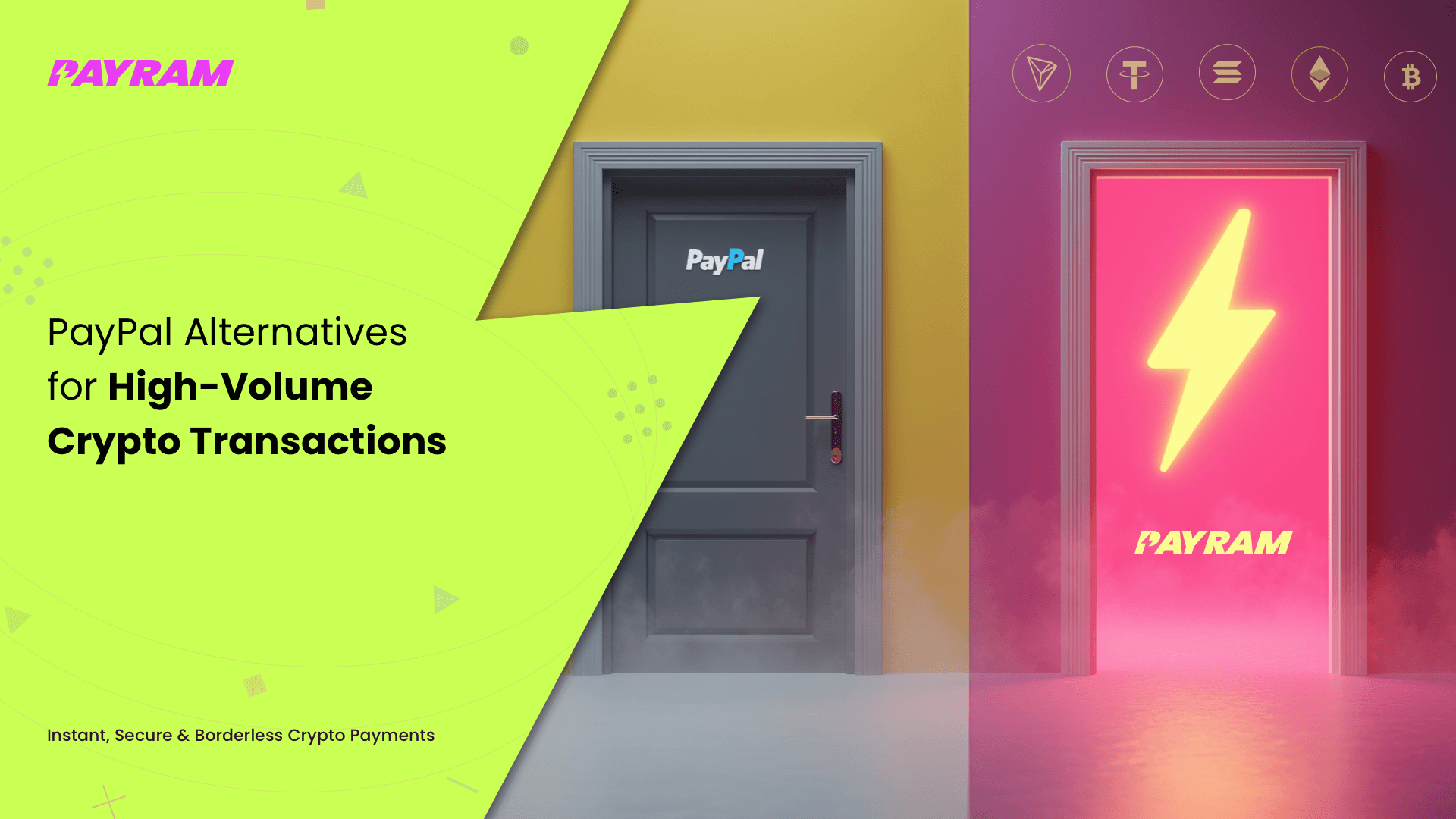



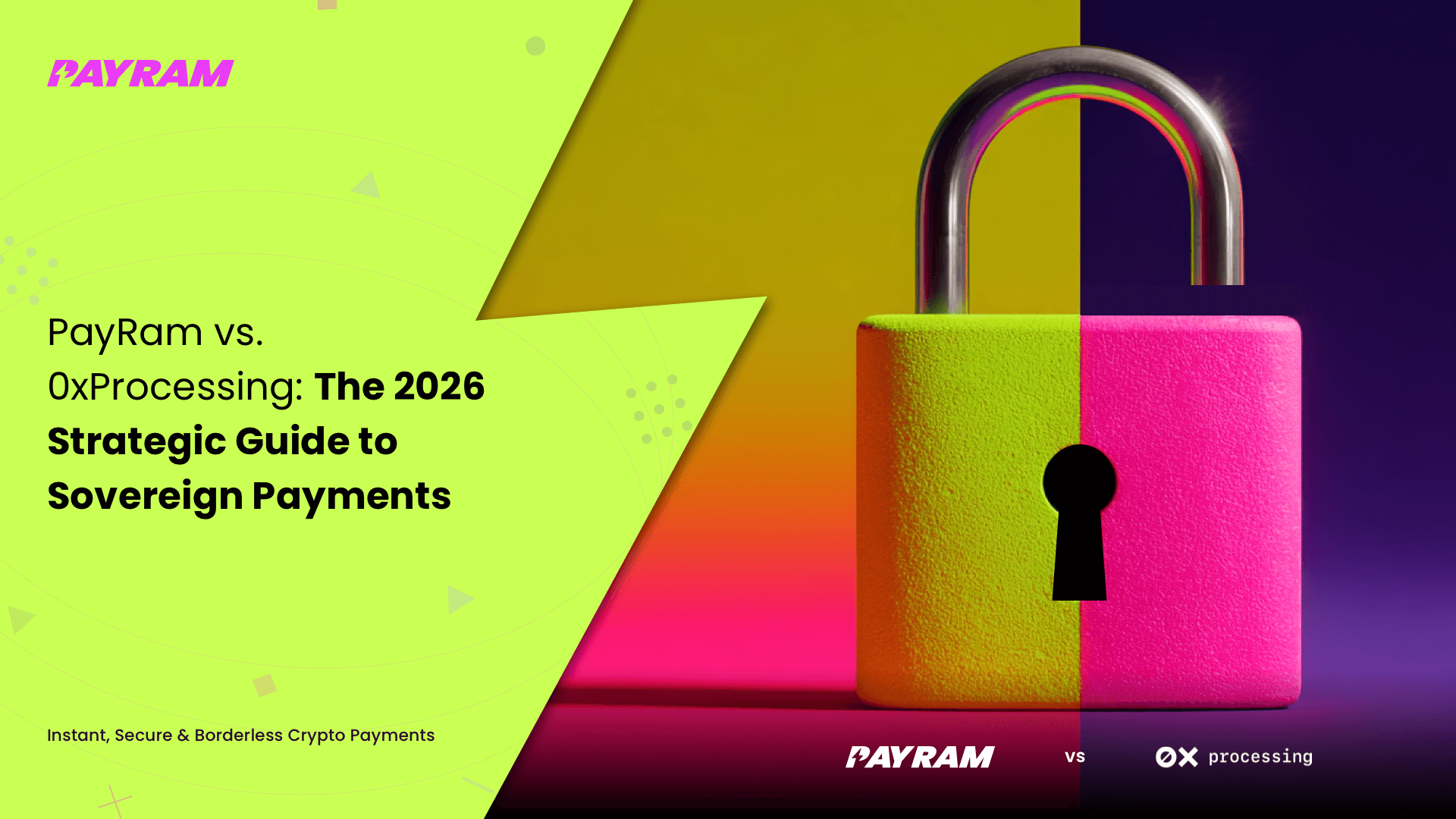
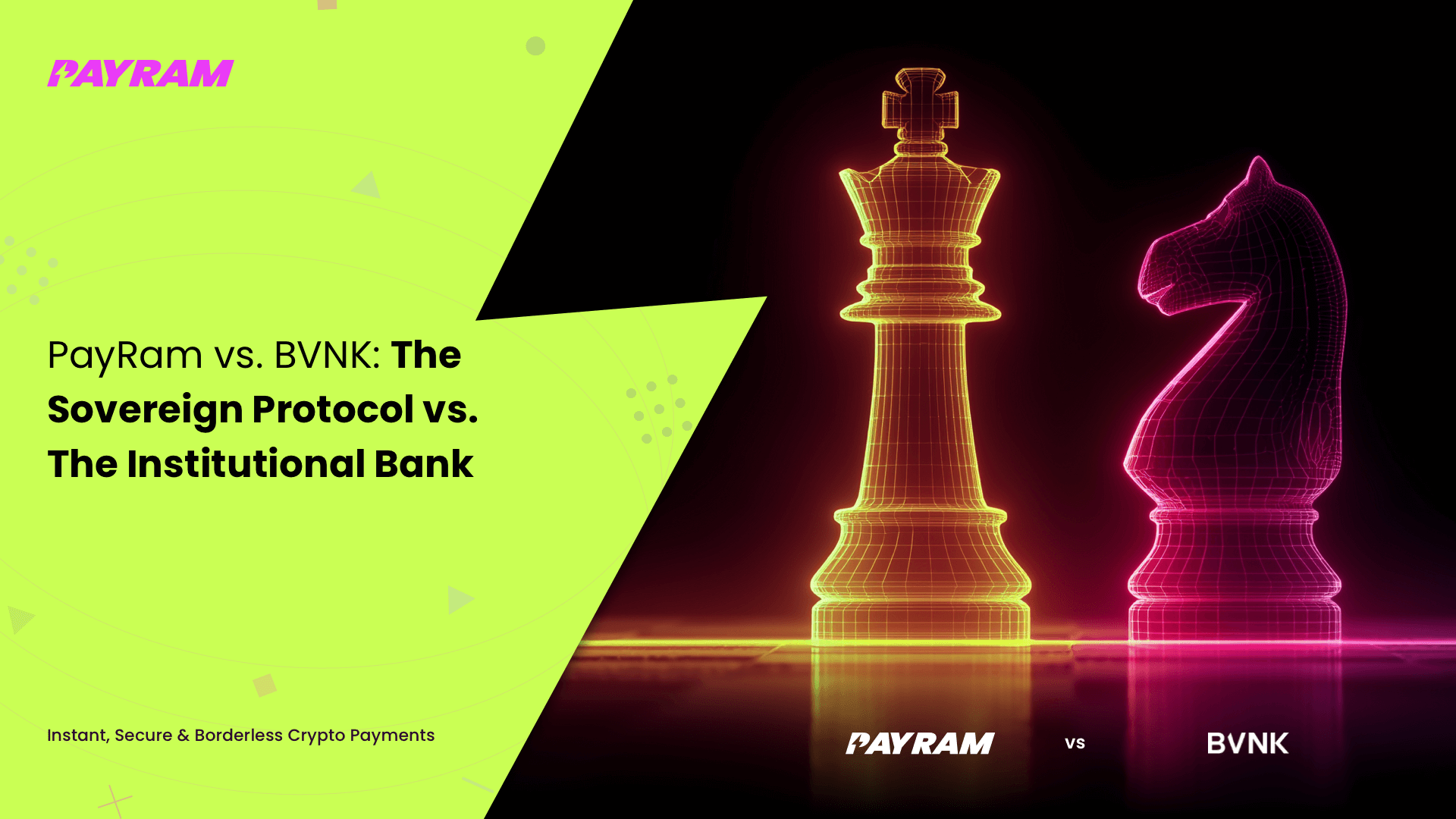

.svg)